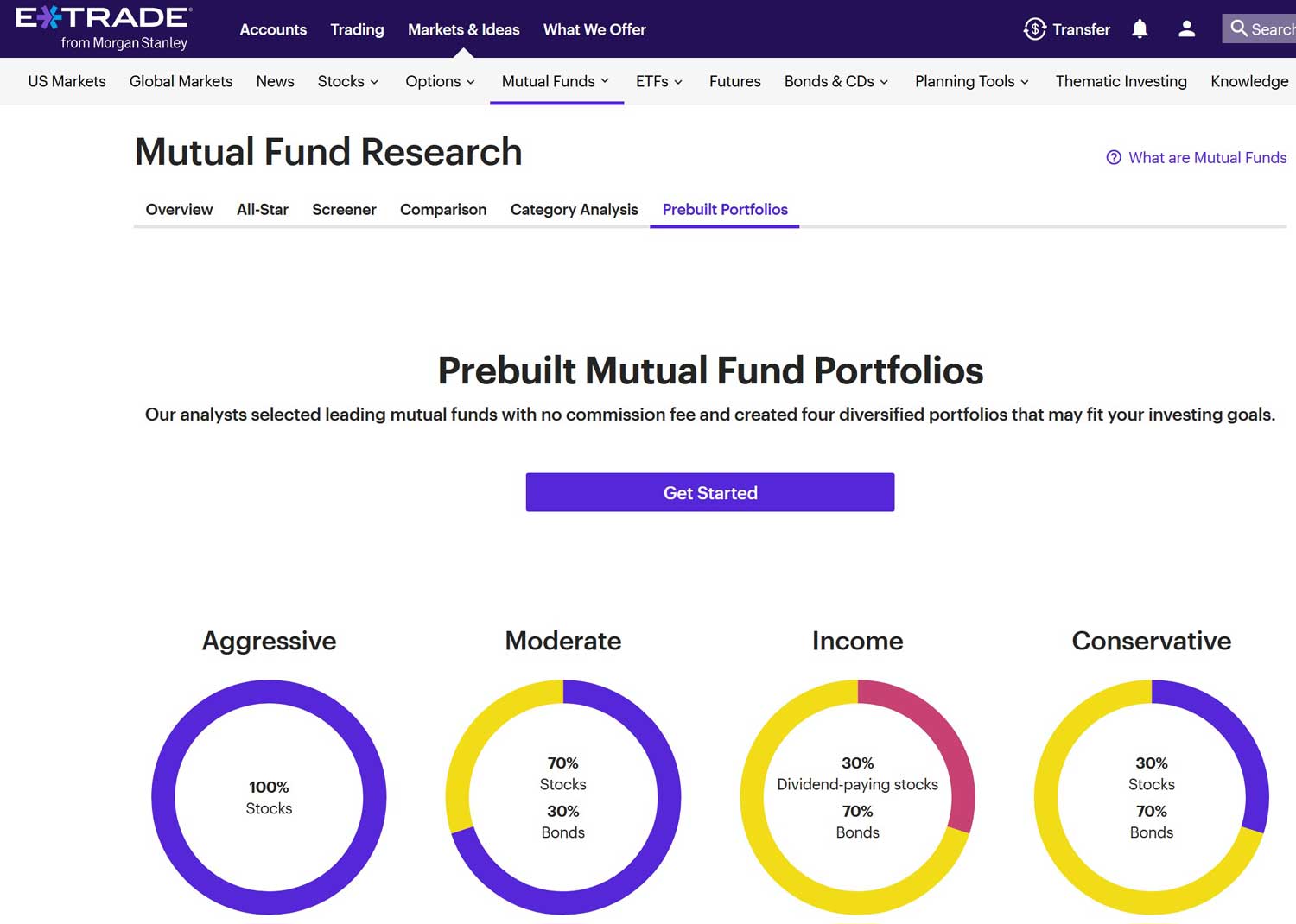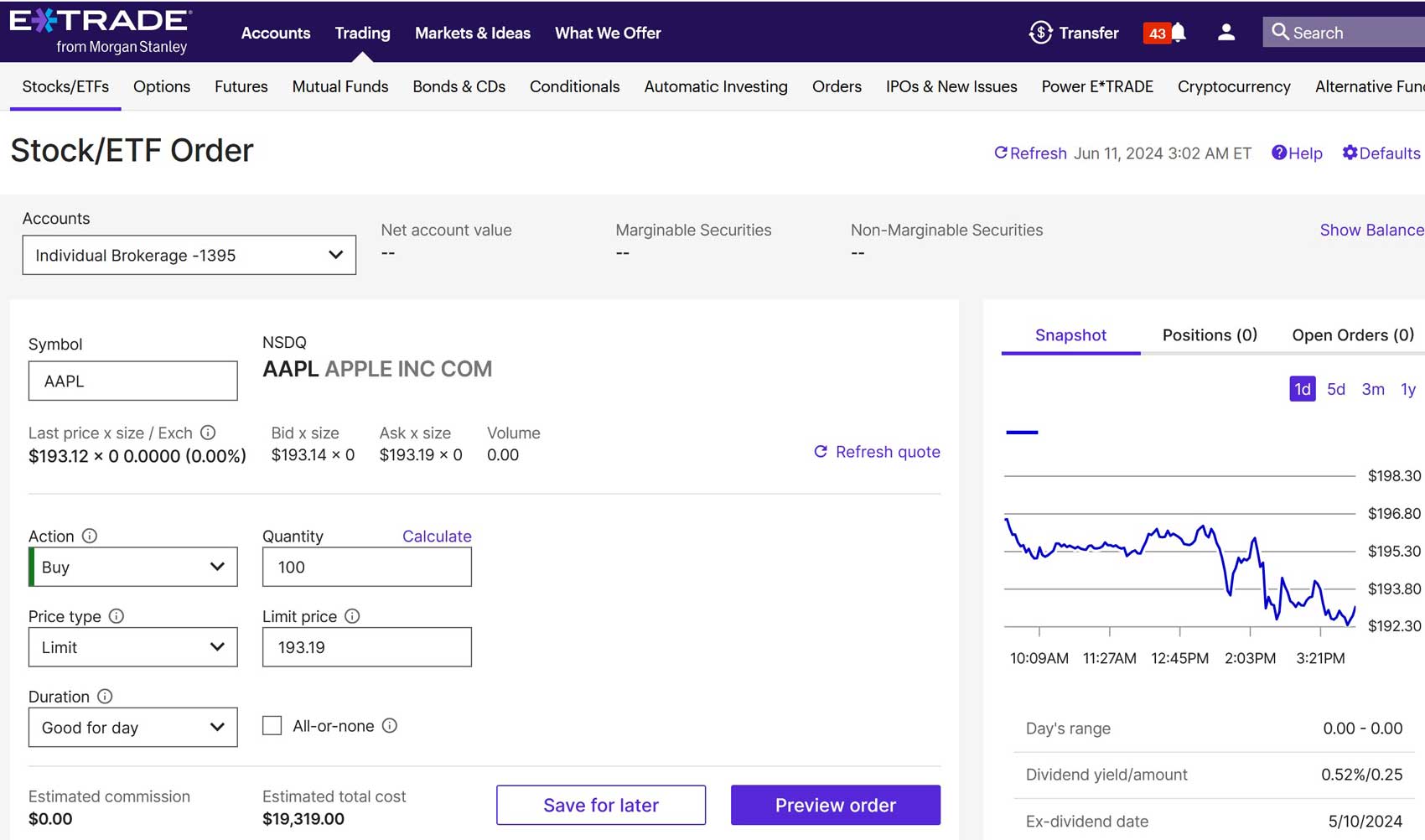TIAA and E*Trade Comparison
TIAA manages twice the client assets of E*Trade, but does that make it the better option? Here’s what we found:
Cost
| Broker Fees |
Stock/ETF
Commission |
Mutual Fund
Commission |
Options
Commission |
Maintenance
Fee |
Annual IRA
Fee |
|
TIAA
|
$0
|
$50
|
$0 per contract
|
$0
|
$0
|
|
Etrade
|
$0
|
$0
|
$0 + $0.65 per contract
|
$0
|
$0
|
|
Charles Schwab
|
$0
|
$49.95 ($0 to sell)
|
$0 + $0.65 per contract
|
$0
|
$0
|
Services
| Broker Review |
Cost |
Investment Products |
Trading Tools |
Customer Service |
Research |
Overall Rating |
|
TIAA
|

|

|

|

|

|

|
|
Etrade
|

|

|

|

|

|

|
|
Charles Schwab
|

|

|

|

|

|

|
Promotions
E*Trade:
At E*TRADE, get $0 trades + 65₵ per options contract.
TIAA:
Open a TIAA investment account.
Charles Schwab: Get $0 commissions + satisfaction guarantee at Charles Schwab.
Mutual Funds and ETFs
E*Trade offers 8,449 mutual funds through its screener, with 4,203 of them having no load and no transaction fee. The brokerage also provides a list of All-Star Funds that are selected for their potential to outperform, and accessing this list comes at no cost.
For ETFs, E*Trade offers commission-free trading on all ETFs. Additionally, E*Trade has introduced overnight trading for a select group of ETFs, including popular ones like QQQ, SPY, and GLD.
TIAA offers access to over 6,500 mutual funds, but its screener doesn’t allow filtering by load status or transaction fees, making it difficult to determine which funds come with extra charges. We do know that some of these funds are no-load and no-transaction-fee.
E*Trade takes the lead in this category.

Other Investments
E*Trade offers trading in stocks, options, bonds, ETFs, mutual funds, and futures. TIAA provides the same range of investments, except for futures. On the other hand, TIAA offers fixed and variable annuities for retirement savers, which E*Trade does not.
This one’s a tie.
Investment Education
E*Trade’s website features a wealth of learning materials, including articles and videos on topics like retirement planning, bond investing, and using the broker’s software. The site also lists upcoming webinars. For options trading, E*Trade provides tools like a screener and a probability calculator.
TIAA also offers educational resources, but the articles are shorter, and there are no videos. Topics include dollar-cost averaging, compound interest, and bond commentary.
E*Trade’s screeners offer more search criteria, and its security profiles provide more information, including free stock reports.
E*Trade wins this round.
Trading Tools
TIAA customers can trade on the broker’s website, which offers basic charting and limited tools. The order ticket is simple, with no advanced order types.

On the positive side, TIAA’s website includes option chains and a trade bar, though the bar cannot place orders. Alerts and watchlists are also available.
E*Trade’s browser platform, Power E*Trade, offers more advanced features, such as full-screen charting, complex order types, and live streaming of Bloomberg Business News. E*Trade also provides a desktop platform, accessible with ten trades per month.
E*Trade is the clear winner here.
Mobile Apps
TIAA’s mobile app is as basic as its website. It lacks charting, security profiles, mobile check deposit, live news, and funds transfer. The trade ticket is confusing, not because it’s complex, but because of its poor design. There are no option chains, making the app almost unusable.

E*Trade offers two mobile apps. One is a Power version of its browser platform, with features like watchlists, option chains, stock profiles, charting, and news articles. The other app provides mobile check deposit and some duplicated features.

TIAA falls short again.
Recommendations
So, who comes out on top? Or more importantly, who’s better at what?
For active stock and options trading, E*Trade is the clear choice over TIAA. TIAA simply doesn’t have the tools for this type of trading.
Mutual fund investors will find more options and better resources at E*Trade.
For portfolio management, both firms offer competitive services, but E*Trade gives customers a full year of its robo-advisory service for free, making it the better choice.
For banking services, both brokers are competitive, offering unlimited ATM fee rebates with minimum balances. However, TIAA offers $15 of ATM rebates for any balance, which E*Trade does not, so TIAA takes the win here.
For retirement accounts, both brokers have unnecessary IRA fees, so it’s a tossup.
For customer service, E*Trade is the better choice, with 24/7 service and online chat, which TIAA lacks.
Promotions
E*Trade:
At E*TRADE, get $0 trades + 65₵ per options contract.
TIAA:
Open a TIAA investment account.
Charles Schwab: Get $0 commissions + satisfaction guarantee at Charles Schwab.
TIAA vs E*Trade: Which is Better?
While TIAA excels in some areas, E*Trade outperforms in most. E*Trade is the winner. More client assets don’t necessarily make TIAA the better broker.
Find a Financial Advisor
If you are looking for a professional money management service in your area, you can
find a Financial Advisor on the Wiser Advisor.
Try Wiser Advisor
Updated on 8/23/2024.
|